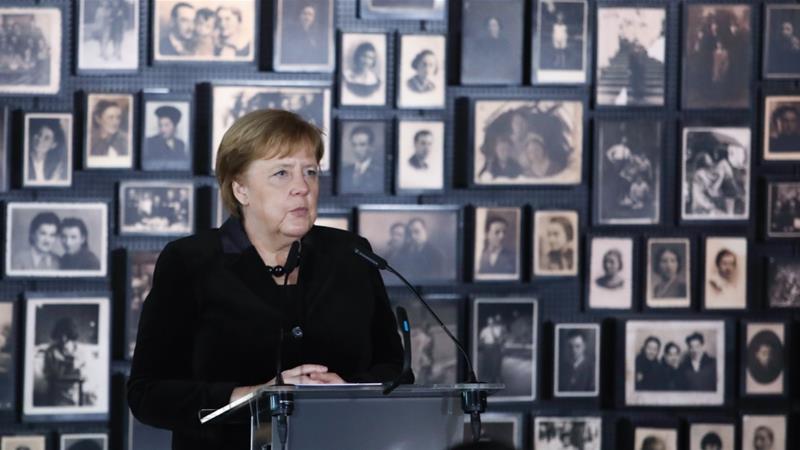Germany's Merkel expresses 'deep shame' during Auschwitz visit
While visiting Holocaust memorial, chancellor pledges to fight rising anti-Semitism and racism in Germany, Europe.
Angela Merkel has expressed “deep shame” during her first visit as Germany’s chancellor to the Auschwitz-Birkenau Holocaust memorial and pledged to fight rising racism and anti-Semitism in her country and Europe.
A black-clad Merkel said on Friday that the crimes committed at the site in southern Poland, where the Nazis ran their largest death camp, would always be part of German history.
More:
-
On anti-Semitism and Islamophobia in Europe
-
Eastern German city Dresden declares ‘Nazi emergency’
-
Italy: Holocaust survivor’s protection highlights rise in racism
“This site obliges us to keep the memory alive. We must remember the crimes that were committed here and name them clearly,” Merkel said during a ceremony attended by Polish Prime Minister Mateusz Morawiecki.
“I feel deep shame given the barbaric crimes that were committed here by Germans,” she added.
Before her speech, Merkel and Morawiecki toured the camp’s crematorium where victims’ bodies were burned.
They walked through the camp’s iron gate bearing the motto “Arbeit macht frei” (Work sets you free) and visited the barracks.
‘Rising intolerance’
Merkel has regularly acknowledged German responsibility for atrocities in World War II. Her visit – the first by a sitting German chancellor since Helmut Schmidt, who came in 1977, and Helmut Kohl, who visited in 1989 and 1995 – is seen as highly symbolic at a time of an alarming increase in hate crimes.
“Today, we are experiencing a worrying racism, rising intolerance, and a wave of hate crime,” Merkel, who has been in power for 14 years, said in her speech.
“We are experiencing an attack on the fundamental values of democracy and a dangerous revisionism of history which is used for the purpose of hostility against certain groups.”
Leaders of the far-right Alternative for Germany (AfD) – the biggest opposition party in the Bundestag national parliament – have been accused of trying to play down Nazi crimes and suggesting that history must be re-written to focus on German victims.
“We are particularly turning our attention to anti-Semitism, which threatens Jewish lives in Germany, the European Union and beyond,” Merkel said.
“Auschwitz was a German extermination camp, operated by Germans. It is important for me to stress this fact. It is important to clearly name the culprits: it is us Germans and we owe this to the victims and to ourselves,” she added.
The timing of the visit is also significant because of questions over Merkel’s political future as tensions persist within the governing coalition.
The Sueddeutsche Zeitung, which first reported on the visit last month, said she wanted to make the trip before any potential political crisis.
Merkel wants to step down at the end of her mandate in 2021 but there is a chance that the date could be brought forward if her junior coalition partners, the Social Democrats, pull out of the government.
The 65-year-old chancellor said Germany’s federal government and its 16 states would provide a 60 million euros ($66.1m) donation to help conserve the site where an estimated 1.1 million people were killed, most of them Jews.
More than three million of Poland’s 3.2 million Jews were killed during the Holocaust, roughly half of all the Jews murdered during World War II.
UpFront
UpFront special: The rise of anti-Semitism
Source: Read Full Article




